The Hindu Editorial (Lame excuses) – May 15, 2024
To read this article, click “The Hindu”.
This preview is provided here with permission.
Courtesy: The Hindu
The Hindu Editorial (Lame excuses) – May 15, 2024:
- lame (adjective) – impaired, infirm, debilitated, deformed, pained.
- ethnic (adjective) – relating to a population subgroup (cultural, national, traditional/folk) with a common national or cultural tradition.
- conflict (noun) – dispute, quarrel, disagreement, difference of opinion, friction, strife, discord.
- migration (noun) – the movement of people within the borders of the same country or across international borders in order to find work or better living conditions.
- coup d’etat (noun) – (in politics) a sudden, violent, illegal takeover of a government by force; seizure of power, coup, overthrow, ousting, deposition, regime change, putsch.
- junta (noun) – a military group that takes over the government by force.
- usurp (verb) – seize a position of power by force (or without legal right); take over, expropriate, appropriate, commandeer, wrest, grab, claim, steal
- absolute power (noun) – complete authority/control; the power held by a leader of an autocracy or dictatorship.
- unleash (verb) – let loose, release, let something go uncontrollably.
- repression (noun) – persecution, ill treatment, suppression, oppression, exploitation, suffering.
- in order to (phrase) – so as to, with the intention of, for the purpose of.
- clamp down on (phrasal verb) – to become more strict in dealing with a problem; to take strict or stern actions to stop something; clamp down on; get tough on, keep under control, repress, suppress, restrict
- democracy (noun) – a system of government in which power is vested in the people, who rule either directly or through fairly & freely elected representatives.
- marginalised (adjective) – treated as insignificant, treated as unimportant, neglected.
- identity (noun) – a social category, a set of persons marked by a label and distinguished by rules deciding membership and (alleged) characteristic features or attributes; individuality, character, originality.
- prone (adjective) – susceptible to, vulnerable to, liable to, subject to, vulnerable to, at/in risk of.
- war-prone (adjective) – subjected to war/armed conflict; suffering from war or armed clash.
- displacement (noun) – a forced removal/departure of people from their homes, mainly due to war/natural disaster/persecution.
- sought past and past participle of seek (verb) – ask for, request, appeal for; try, aim, attempt.
- refuge (noun) – protection, shelter, asylum.
- neighbouring (adjective) – adjacent, bordering, abutting, surrounding; nearby.
- refugee (noun) – displaced person, asylum seeker, exile, deportee, stateless person, émigré.
- fled past & past participle of flee (verb) – escape, abscond, run away, take flight, leave abruptly/hastily.
- campaign (noun) – an organized effort that seeks to influence the decision-making progress within a specific group.
- head (verb) – move towards, go towards, go in the direction of.
- ethnicity (noun) – a category of people who identify with each other based on common language, ancestral, social, cultural, or national experiences.
- regard (verb) – consider, view, see.
- brethren (noun) – believer, adherent, follower, loyal follower, faithful.
- conflate (verb) – combine, abridge/summarize (too many information into one); shrink, shorten, reduce.
- cross-border (adjective) – across a border between two states/countries.
- Kuki-Zomi community (noun) – The Kuki people are an ethnic group native to the state of Manipur and other states in northeastern India. The “Mizo” (poetic version of “Zomi”), people are a ethnic group native to the Indian state of Mizoram and neighbouring regions of Northeast India.
- Meitei/Manipuri people (noun) – an ethnic group native to the state of Manipur in northeastern India. Valley-dwellers & non-tribals Meitei/Manipuri comminity is the largest & dominant community in Manipur, account for about 53% of the State’s total population of 2.85 million (2011 census).
- refrain (noun) – a comment or statement that is often repeated
- preponderance (noun) – dominance, ascendancy, leadership, mastery, supremacy, control, sway, power.
- majoritarian (adjective) – relating to a philosophy that states that a majority (sometimes categorized by religion, language, social class, or some other identifying factor) of the population is entitled to a certain degree of primacy (priority) in society, and has the right to make decisions that affect the society.
- regime (noun) – government, administration.
- led to past and past participle of lead to (verb) – cause, bring on, bring about, result in, produce, give rise to.
- stigmatisation (noun) – accusation, cursing, denouncement, discredit, dishonor, disparagement.
- stark (adjective) – distinct, obvious, evident, clear, clear-cut, striking.
- in contrast to (phrase) – in opposition to.
- humanitarian (adjective) – compassionate, humane, socially concerned.
- move (noun) – activity, step, measure.
- seek (verb) – try, aim, attempt.
- Free Movement Regime (FMR) (noun) – The FMR came into existence in 2018 as a part of India’s Act East policy. The FMR is a mutually agreed arrangement between the two countries that allows people (tribes) living along the border on either side to travel up to 16 km inside the other country without a visa.
- regime (noun) – system, scheme, policy.
- fence (verb) – secure, protect, defend (with a fence).
- migrant (noun) – a person who moves from one region to another – either within a country or across national borders in order to find work or better living conditions.
- seen in this light (phrase) – it means “to give a different perspective to something”.
- displace (verb) – force someone to leave his/her home, usually due to war, persecution, or natural disaster; banish, exile, deport, evict, expel, oust.
- result in (verb) – cause, lead to, bring about, give rise to.
- besides (preposition) – apart from, other than, barring, excluding.
- consequence (noun) -outcome, implications, ramification, repercussion.
- siege mentality (noun) – someone’s defensive, suspicious, fearful attitude/belief that everyone else opposes him/her. People may feel they are under attack by those with different worldviews.
- poppy plant (noun) – poppy plant is grown to extract opium (a highly addictive non-synthetic narcotic).
- opium (noun) – the dried latex/juice obtained from the opium poppy plant. Opiate drugs, derived from the opium, are narcotic sedatives that depress activity of the central nervous system, reduce pain, and induce sleep.
- cultivation (noun) – the act of growing something, especially crops.
- over-simplification (noun) – an act of simplifying something to an extent/degree so that it causes misreporting/misunderstanding/misrepresentation of it.
- biased (adjective) – hostile, hostile, distorted, partisan, prejudiced, colored, one-sided.
- rage (verb) – be violent, be uncontrollable.
- rise above (phrase) – to tackle a difficult or unpleasant situation successfully (or) to not allow a bad situation affects you.
- fray (noun) – competition, contest.
- measure (noun) – action, step, procedure.
- brazen (adjective) – blatant/flagrant; bold and shameless; unashamed, unembarrassed.
- militarisation (noun) – the act of making something similar to armed forces. the process of equipping something (an organisation/etc.) with military forces/resources.
- Valley (noun) – a low area between hills or mountains typically with a river running through it.
- vigilante (noun) – a member of the self-appointed group which unofficially punishing crimes.
- arm (verb) – equip, have (firearms).
- sophisticated (adjective) – modern, advanced, highly developed, the latest, futuristic.
- law and order (noun) – a condition in which the existing rules, regulations, norms and related legal codes are recognized and observed for the sustenance of peace, orderliness and security of lives and property in society; lawful behaviour, order, lawfulness, discipline, peacefulness. (Under the Seventh Schedule to the Constitution of India and therefore, it is the primary duty of the State Governments to prevent, detect, register and investigate crime and prosecute the criminals).
- impede (verb) – hinder, obstruct, hamper, disrupt.
- personnel (noun) – forces, employees, workforce, staff.
- reflect poorly on someone/something (phrase) – to make someone/something to look bad; to damage someone’s/something’s reputation.
- fester (verb) – cause resentment, cause vexation; become worse/intense.
Note :
1. Click each one of the words above for their definition, more synonyms, pronunciation, example sentences, phrases, derivatives, origin and etc. from http://www.oxforddictionaries.com/.
2. Definitions (elementary level) & Synonyms provided for the words above are my personal work and not that of Oxford University Press. Tentative definitions/meanings are provided for study purposes only and they may vary in a different context.
3. This word list is for personal use only. Reproduction in any format and/or Commercial use of it is/are strictly prohibited.
The Hindu Editorial (Lame excuses) – May 15, 2024:
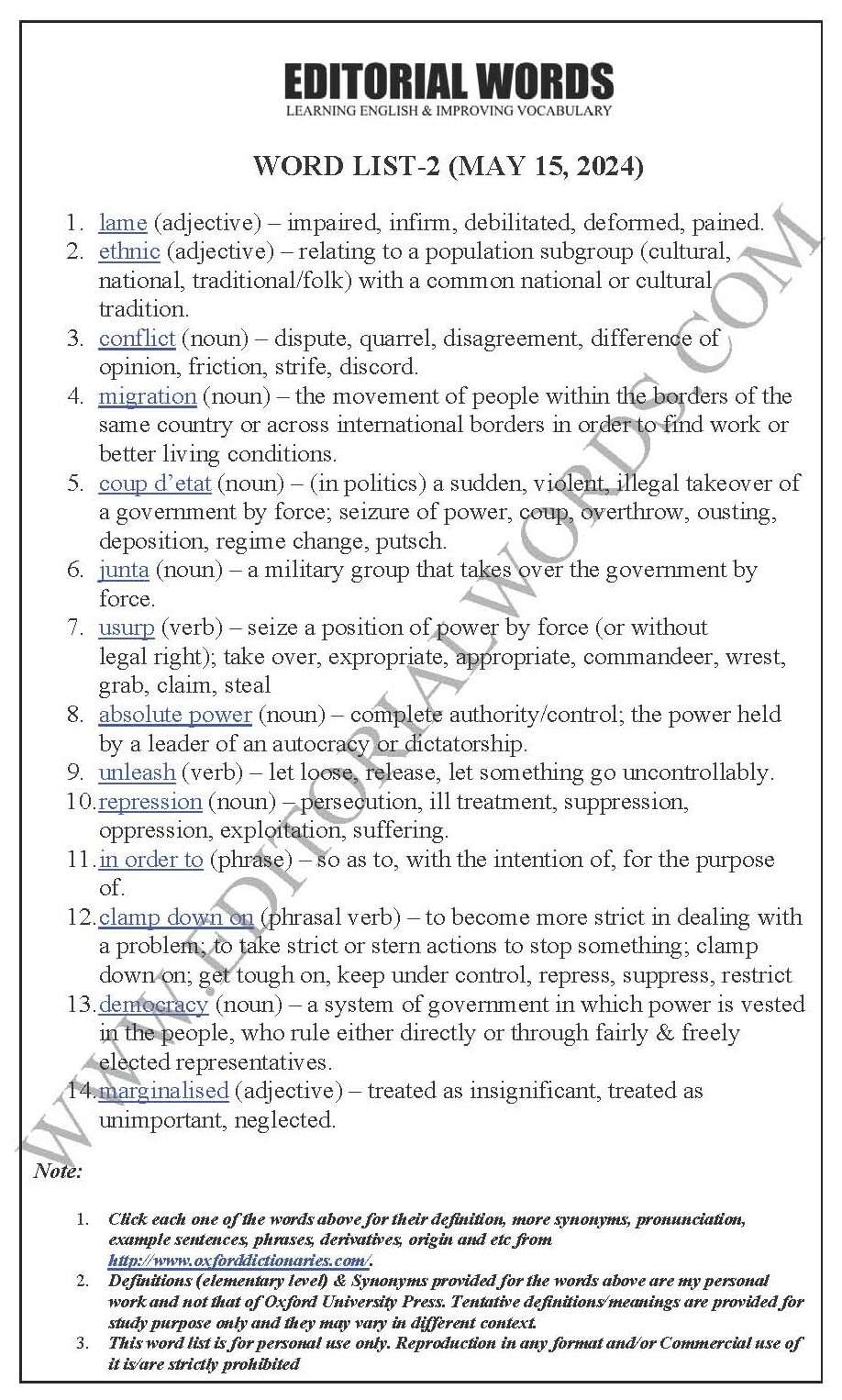
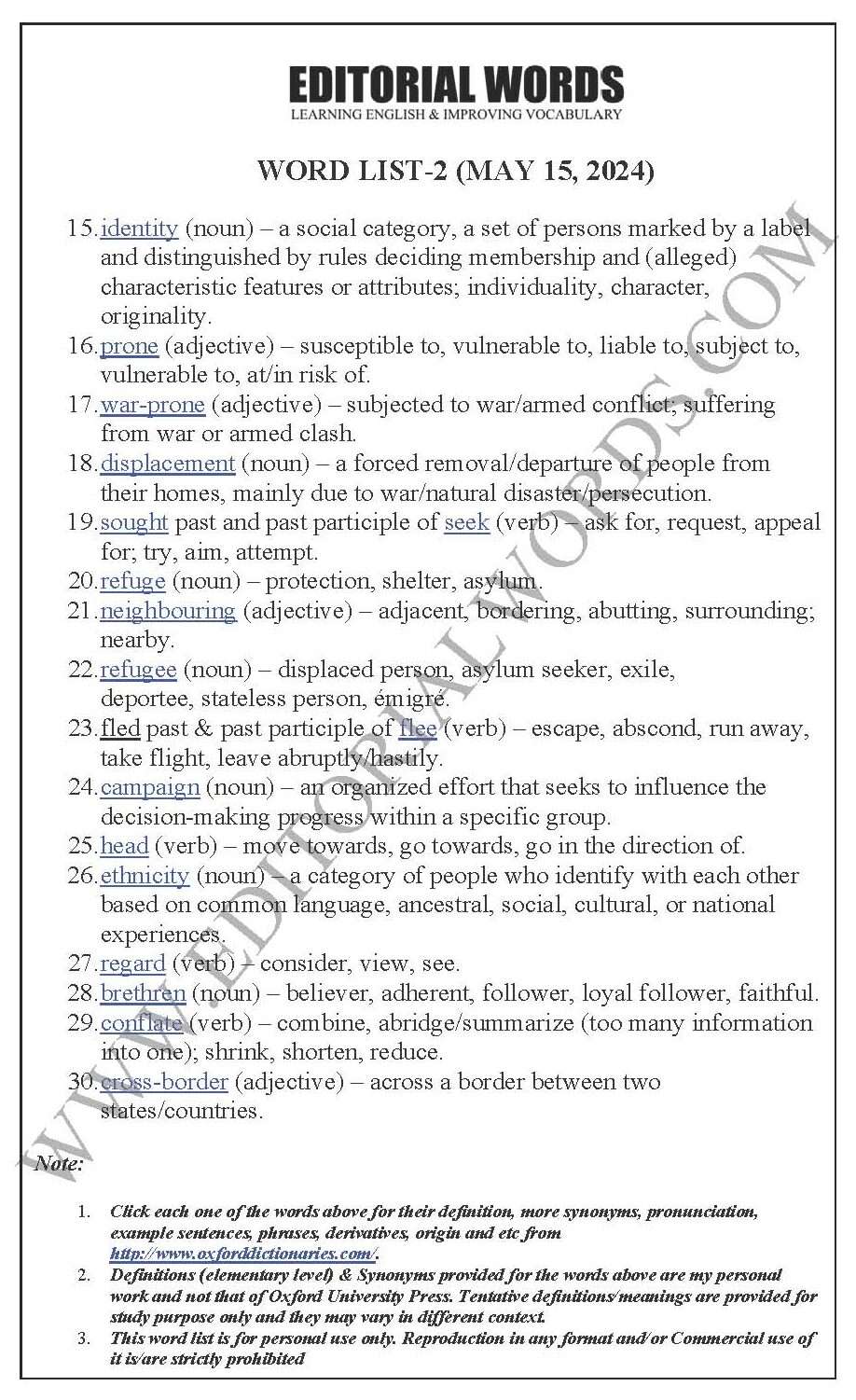
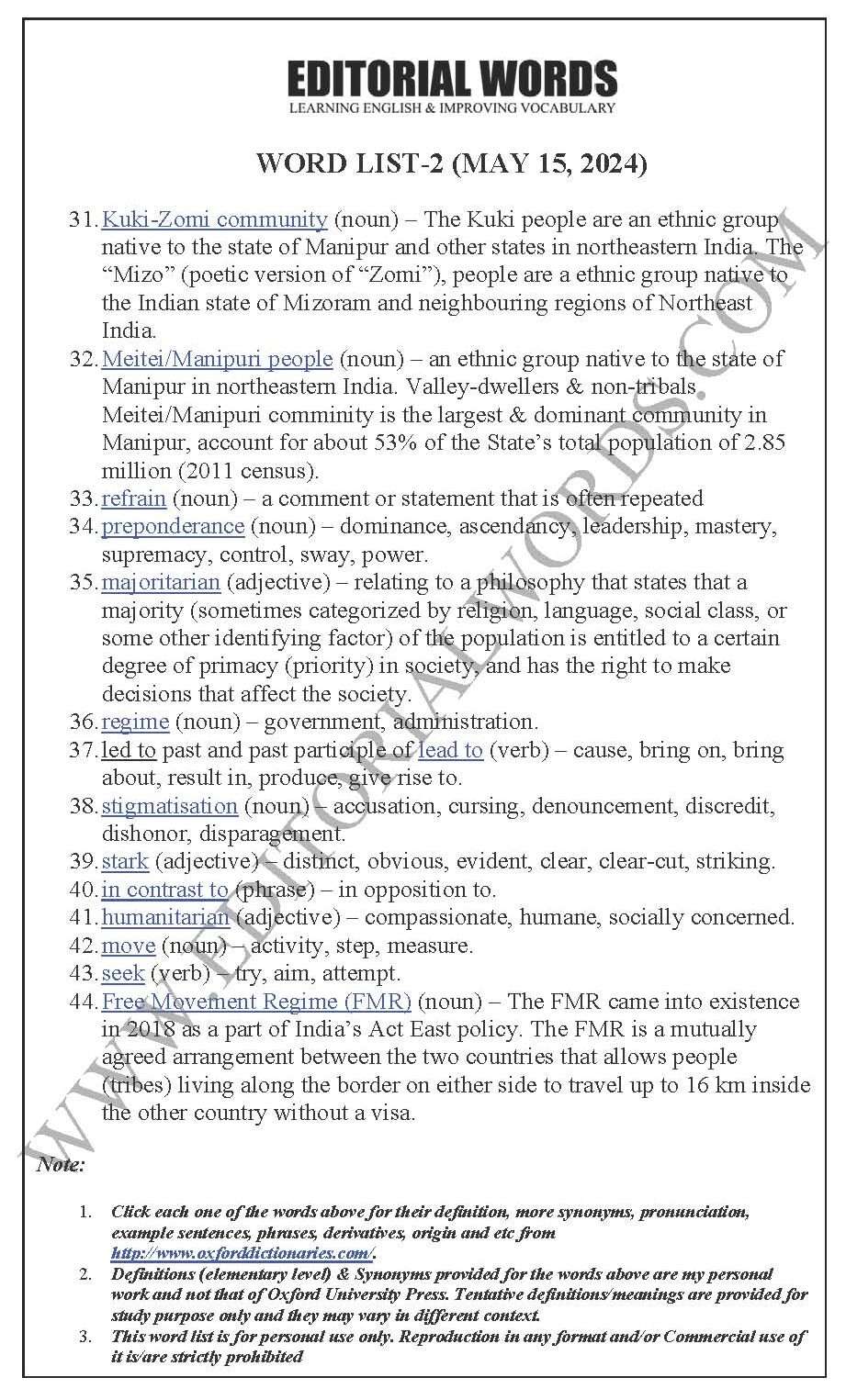
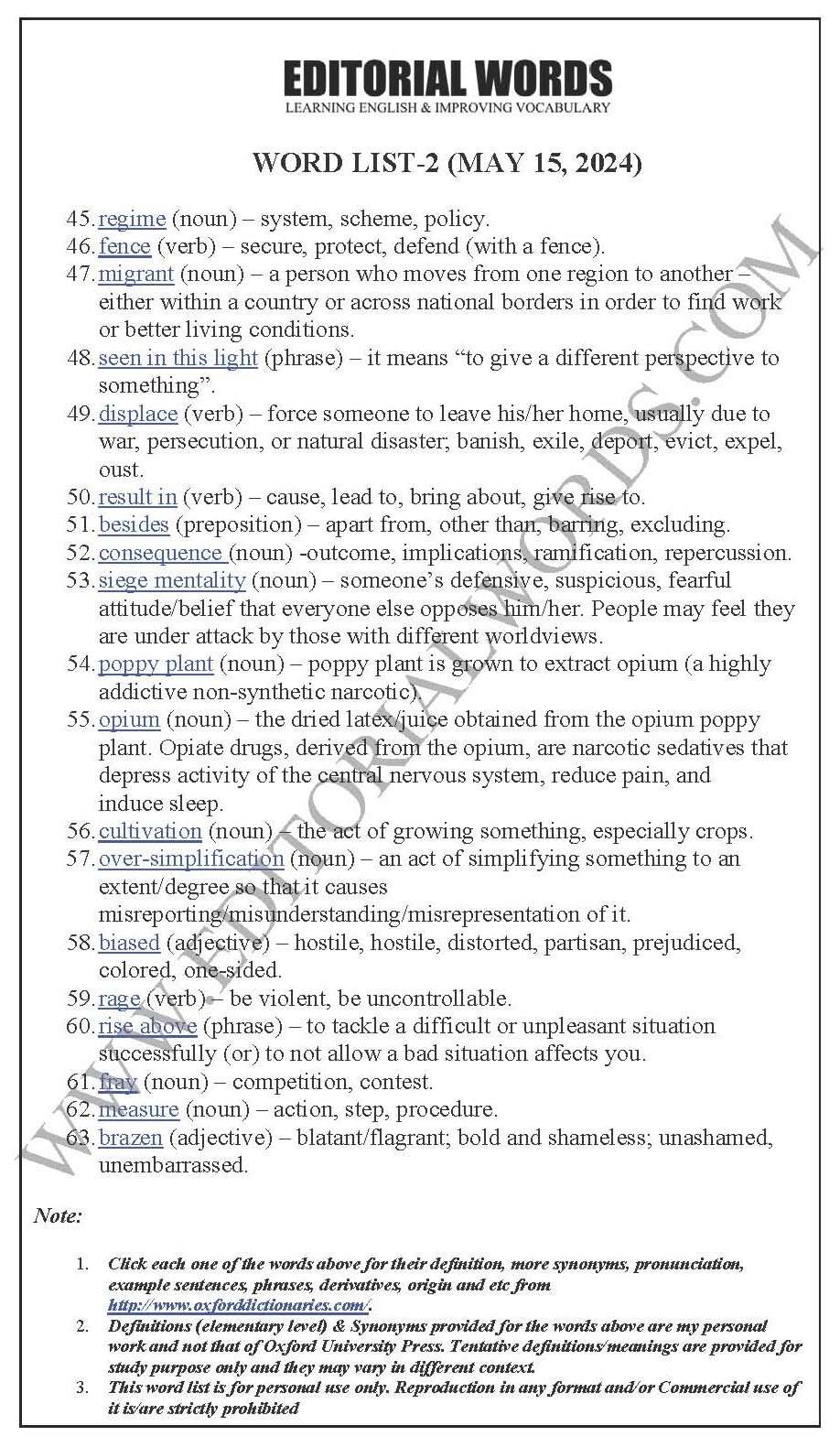
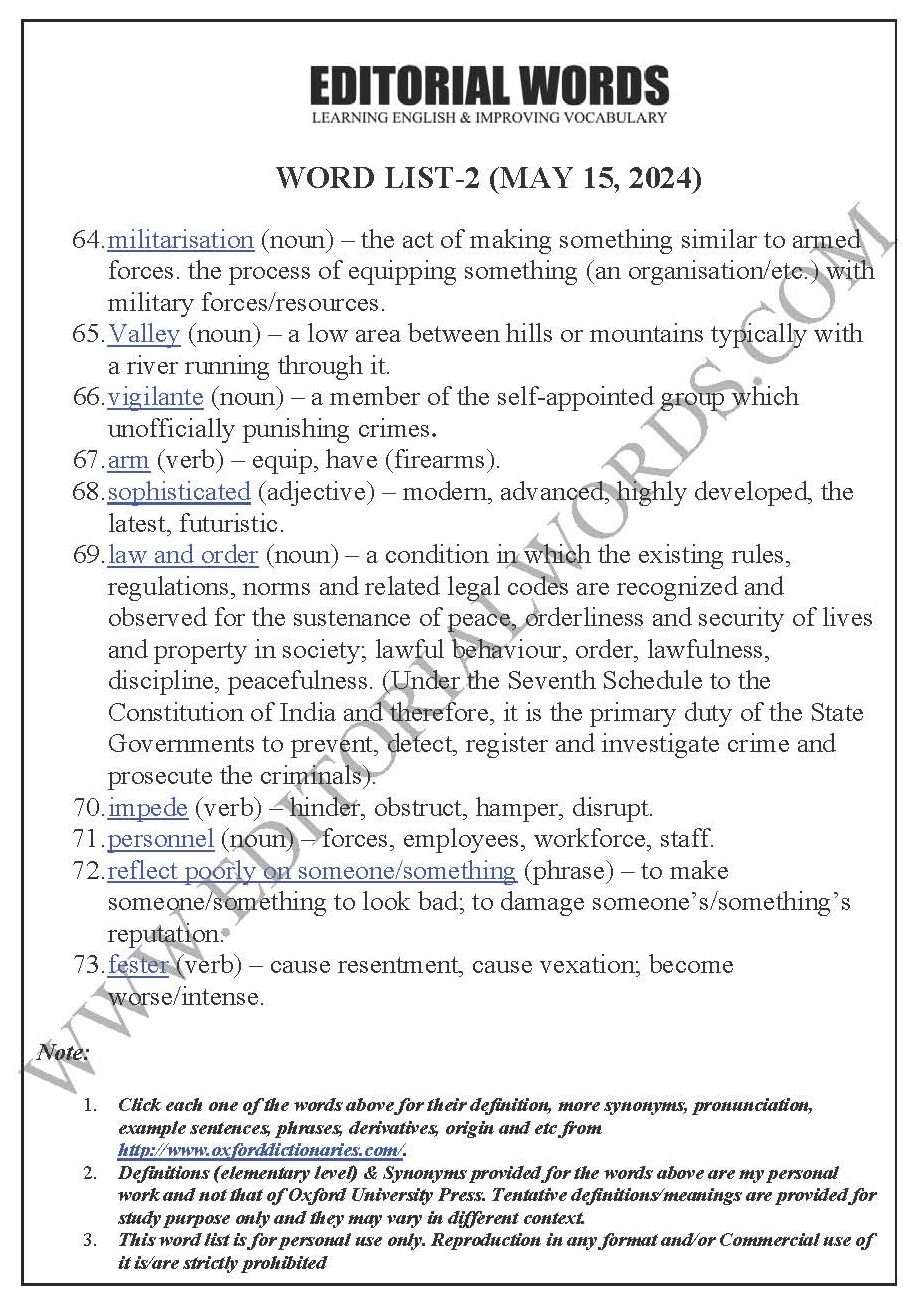
“Phrasal Verbs” We Learnt Last Week
“Idioms & Phrases” We Learnt Last Week
“Important Definitions” We Learnt Last Week
Recent Word Lists For The Hindu Editorial Articles

It has been over three years since the coup d’etat in Myanmar in which the junta usurped absolute power and unleashed severe repression in order to clamp down on any demands for a return to democracy or granting more power to… For further reading, visit “The Hindu”. Below is today’s word list-2 for The Hindu Editorial (Lame excuses) – May 15, 2024.